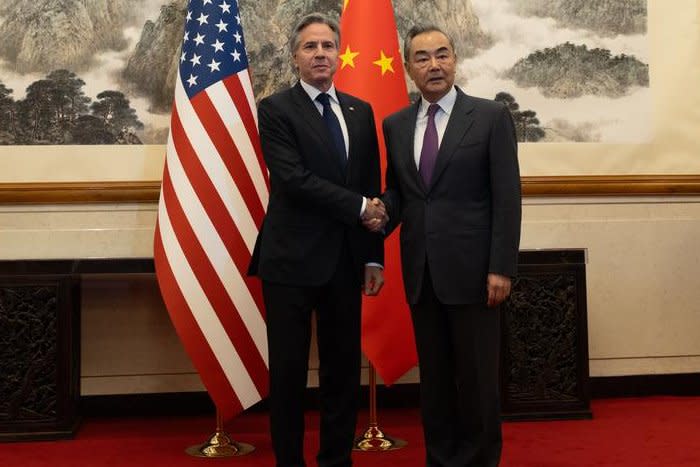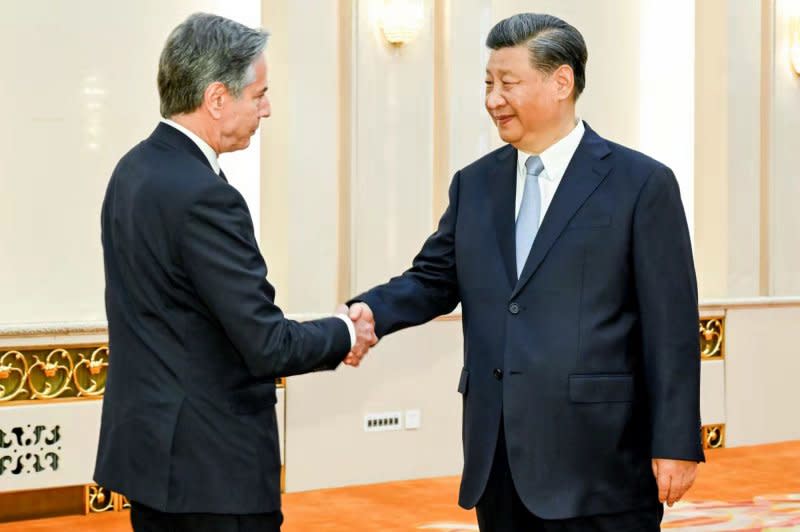Blinken discusses serious economic and security issues with Chinese leaders

- Oops!Something went wrong.Please try again later.
- Oops!Something went wrong.Please try again later.
April 26 (UPI) -- U.S. Secretary of State Antony Blinken said in Beijing Friday he raised serious economic and security issues with Chinese President Xi Jinping and other top officials focused on advancing commitments made last year at Xi's summit with President Joe Biden.
"In the months since then we focused intensively on advancing those commitments. I returned to China this week to take stock of where we've made progress and where more needs to be done so that we can deliver tangible results to the American people," Blinken said.
Blinken said he discussed a wide range of issues with Chinese leaders from economics to global security.
"America's actions are not aimed at holding back China's development, nor are we decoupling our economies. [Treasury Secretary Janet] Yellen said during her recent visit that would be disastrous for the global economy, including for the United States," he said.
But he said the way China grows matters. He warned that China is flooding markets, undermining competition and putting economies and livelihoods at risk around the world.

"President Biden will not let this happen on his watch," Blinken said. "We will do what's necessary to make sure that American workers can compete on a level playing field."
Blinken said he told his Chinese counterparts the United States and China must foster a healthy economic relationship where American workers and firms are treated equally and fairly.
The economic discussions included an agreement to hold talks on artificial intelligence.
"We agreed to hold the first talks on artificial intelligence to be held in the coming weeks. We'll share our respective views on the risks and safety concerns around advanced AI and how best to manage them," Blinken said.
On security issues, Blinken raised concerns about China's support of Russia's military industrial base, South China Sea actions Blinken called dangerous, Taiwan and the erosion of Hong's autonomy and democratic institutions.
"I made clear that while the U.S. will continue to work to de-escalate tensions, our defense commitments to the Philippines remain ironclad," Blinken said. "I reaffirmed the U.S.'s one China policy and stressed the critical importance of maintaining peace and stability across the Taiwan Strait."
He urged China to stop enabling Russia's defense industrial base that is being used to wage a war of aggression against Ukraine.
The Biden administration has threatened to impose sanctions on Chinese companies' sale of dual-use materials and weapons components to Russia for use in its war against Ukraine and also pose a threat to Europe.
"In my discussions today I reiterated our serious concern about the PRC providing components that are powering Russia's brutal war of aggression against Ukraine," Blinken said. "China is the top supplier of machine tools, microelectronics, nitrocellulose, which is critical to making munitions and rocket propellants and other dual-use items Moscow is using to ramp up its defense industrial base. "
He said those components are used to churn out weapons that Russian President Vladimir Putin uses against Ukraine to "attack the power grid and other civilian infrastructure and to kill innocent women, children and men."
Without Chinese support, Blinken said, Russia would struggle to sustain its assault on Ukraine. He told Chinese leaders Russia's war and its military-industrial base threaten European security.
Blinken also urged China to use its influence to discourage Iran and its proxies from expanding the conflict in the Middle East and to press North Korea to end what Blinken described as its dangerous behavior and to engage in dialogue instead.
Blinken said military-to-military communications between China and the U.S. have resumed "at multiple levels."
On fentanyl and other illicit drugs Blinken said U.S.-China cooperation has advanced, but more needs to be done. He said those drugs are the number one killer of Americans aged 18-45.
Blnken said China has increased enforcement action and is also providing information to international law enforcement to intercept illegal drugs. He called that important progress while calling for further Chinese action on the issue.
The U.S.-China relationship could either continue to stabilize or spiral downward, China's foreign minister Wang Yi warned Friday as he met Blinken, in Beijing as the diplomats seek to foster dialogue between their two countries amid conflicts.
Wang remarked during the joint press conference in Beijing on Friday that the U.S.-China relationship has begun to normalize, stating dialogue, cooperation and "the positive side of the relationship" have increased, but that negative factors remain hindrances.
"China's legitimate development rights have been unreasonably suppressed and our core interests are facing challenges," he said.
He said that their relationship was at a precipice, and that the world was waiting to see what will happen.
"This is a major question before our two countries," he said.
"Should our two sides lead international cooperation against global issues and achieve win-win for all, or engage in rivalry and confrontation or even slide into conflict, which would be a lose-lose for all? The international community is waiting for our answer."
He said China's position has been consistent -- that it wants mutual respect and peaceful coexistence with the United States -- but that so, too, are its concerns, which are for Washington to not interfere in Beijing's internal affairs, not to hold back its development "and not to step on China's red lines on China's sovereignty, security and development interests."
Blinken stressed the importance of their two countries continuing to improve communications and implementing the agreements their two presidents agreed to when they met in November.
He called their relationship "the most consequential ... in the world" and that there is no substitute for face-to-face diplomacy, as it can move their relationship forward while making it possible to avoid misunderstandings and miscalculations where they have differences.
"That really is a shared responsibility that we have not only for our own people but for people around the world given the impact that the relationship between our countries has around the world," Blinken said.
The meeting comes as the two countries seek to if not repair their relationship, then prevent it from worsening.
In August of 2022, then-House Speaker Nancy Pelosi visited Taiwan, which China responded to with fury and a military exercise nearby.
China views Taiwan as a rogue province that it has vowed to take back by force if necessary. The self-governing island has been a source of strain in the U.S.-China relationship, as the United States has deepened its ties with Taiwan, including militarily.
The visit resulted in Beijing ending high-level military-to-military communications with the United States, which were only repaired recently, with the heads of their militaries holding their first conversation since November 2022 10 days ago.
In February 2023, their relationship was further strained when Blinken canceled plans to visit Beijing after a Chinese balloon was spotted flying over the United States.
In the last year, the Biden administration has sought to improve communications with Beijing, with several high-ranking officials visiting to at the very least find areas where they could work together, such as climate change.
Biden has also sought to level the economic playing field with China, promising earlier this month to triple tariffs on Chinese steel and aluminum on accusations Beijing has been overproducing the metals and dumping them on the global market, negatively affecting U.S. steelmakers.

